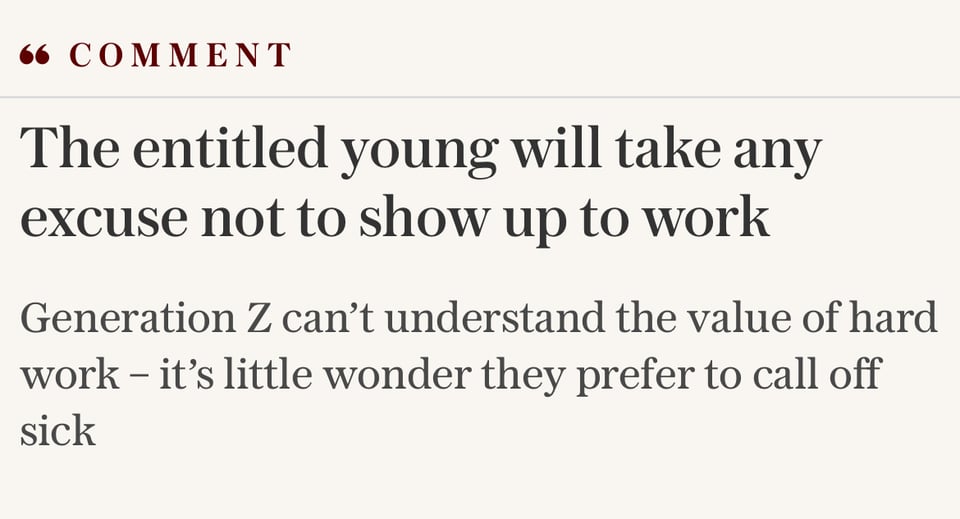FRESH MINDS #001
#001
Sunday 18th August 2024
Intro
Hi, hello and welcome.
It’s here, the first edition of FRESH MINDS.
First of all, thank you for all the support on our initiative!
It is clear that we weren’t the first ones to notice this issue and we’re very happy to be part of the solution. If we just give one Junior some more confidence in themselves that’s a win for us.
Ok enough of the soppy. What will you be reading about in our first edition?
Our fresh minds had the option to pick between three prompts:
“The entitled young” not wanting to work is probably the biggest misconception about Gen Z in the work space. Funnily enough, these headlines emerged without any comment from a Gen Z person themselves. We want to set the record straight, so have asked Gen Z Juniors in our community for their perspective on attitudes to work.
AI - Everyone talks about it, everyone speculates on its impact on the future. AI and Juniors are relatively new to the workspace. Some Juniors may not even know what it would be like working without AI. So what do they think? Will it last?
A more lighthearted topic on using the right amount of exclamation marks when talking to your colleagues… or so we thought. In truth it appears to be quite tricky for Juniors. Struggling between being authentic and wanting to fit in.
We want to get as much as possible out of our fresh minds, which is why we didn’t want to limit their thinking to three topics. The last section is the open topic, where Juniors submit topics of their own. This month we talk about the conflict of under-consumption core.
For all readers, we want to lend a helping hand so we’ll be closing with a selection of recommended resources and tips from our Junior community to make the life a little easier.
(All entries are written by Juniors. To write for the September issue, check out the prompts HERE)
So yeah, let's get into the minds of the fresh.
Stay demure, stay mindful,
A&Z
TOPIC 1:

“I think they are resisting HOW we work”
I think it's quite an ignorant headline. Gen Z aren't rejecting work, as much as they are rejecting the frame*work*.
By that I mean they are rejecting, questioning or challenging the ways of modern working - the 40-hour work week, the 1h commute to an office — rather than work itself.
I don't think it's lost on them that work can be a fulfilling, important part of someone's life, and can at times even contribute to great good, but I think they are resisting HOW we work. Ultimately, I think it's a good thing that there is a critical lens being applied and shared on the way we work.
- Mael Le Pouesard
“So many of my generation are running marathons as it’s one of the only goals we can set ourselves and realistically achieve“
As a Gen Z working in advertising, I understand how critical it is to grasp the dynamics of different generations. Traditional demographic segments like Boomers, Gen X, Millennials, Gen Z, Alpha, Beta and so on often dominate discussions. I believe we need to move to a more culture-led approach.
The essence of marketing lies not in these age-based classifications but in understanding the mindsets shaped by era-defining politics, societal norms, and technological adoption, no matter your age.
It’s unfair, but easy, to put Gen Z’s workplace dejectedness down to laziness. As a generation, we’re facing some tough economic realities. Wages have pretty much flatlined since 2005, while the cost of living has gone through the roof. I won’t even start on student debt, steadily increasing thanks to interest rates.
Someone reading this will be ready to come in with the ‘stop buying avocado toast’ argument, which in some cases I will accept; however, I must also mention 99% of those I surround myself with worship Martin Lewis and are constantly ready to jump current accounts to be rewarded by a £150 bonus. We use our resources to educate ourselves, following financial advice-based Instagram accounts, money-saving TikTok creators, and religiously utilising hacks such as the Coupert Chrome extension. So, while we may occasionally splash out on a treat in the form of avocado toast, that doesn’t take away from the efforts to earn and save money elsewhere.
I recently read an article that so many of my generation are running marathons as it’s one of the only goals we can set ourselves and realistically achieve with hard work. As someone who also signed up for a half marathon this year, due to what I thought was a love for running, I realised having read that article there was probably a strong chance there were other factors at play.
Given these financial hurdles, we’ve adapted by valuing our time and wellbeing more than perhaps previous generations. We understand that overworking doesn’t lead to financial security. We’re very used to uncertainty; therefore, we seek roles that offer flexibility, remote work options, and a healthier work-life balance. Overworking isn’t paying off, so we may as well try and enjoy what we can.
- Amy (Strategist)
“It’s not that Gen Z don’t understand hard work, they understand thoughtful work”
It’s not that Gen Z don’t understand hard work. They understand thoughtful work. If something is pointless to do, they should point that out to management or just go home if there’s nothing else they can do for the day.
- Runda Dong (Startup Founder)
“A more human working future”
I embrace hard work. I thrive on meeting high expectations and putting in the hours. But every generation is diverse, with varying values, attitudes, and motivations. Even if we share basic beliefs, our personal drives are unique. Let's not discuss generational chasms, but instead find common solutions for a more human working future.
- Emma (Strategy Assistant)
TOPIC 2: Juniors and AI
“I went in expecting the materials to be received with glistening eyes […] and Owen Wilson-style 'wow's' to ripple around the room, as they saw what the future holds.“
Wait... You’re not all excited about AI?
Bright-eyed and bushy-tailed, I recently setup a 'Lunch & Learn' for my team, full of case studies and examples outlining what GenAI can do, with the aim to both share my optimism around AI's use cases, and to outlay my hypothesis that we aren't using it enough.
I went in expecting the materials to be received with glistening eyes, a foray of excitement and Owen Wilson-style 'wow's' to ripple around the room, as they saw what the future holds.
Spoiler alert... they did not like what the future holds.
They were actually slightly appalled by it. A team of intelligent, white-collar strategists at a TECH company were largely rejecting Generative AI and what it means for our future. There were glimmers of optimism - they saw the potential of ChatGPT as a thought partner for ideas or as an information sifter. But questions and emotions quickly turned to focus on implications far beyond boosting a bit of office productivity.
What about the jobs it’s going to replace?
Whilst this is a fairly valid & natural concern, it has surrounded the launch of pretty much every new technology ever, from the smartphone to the hoover. As Matt Ridley outlines in his book The Rational Optimist, roughly every year in the US, 15% of jobs are destroyed and 15% of jobs are newly created ones. So yes - specific jobs will be impacted, but new ones will emerge.
Where you lose a graphic designer to Midjourney, you gain a prompt engineer. Where admin roles decline, AI chip production and data centre support roles sky-rocket. We will adapt. That’s what it means to be human and how we progress as civilisation.
The potential for deep fakes is terrifying
I agree. This one is definitely the most concerning for me, from politics to scams to pornography, the list of use cases of artificial media for nefarious actors is worryingly long. And to a large extent, I think we’re at the mercy of the tech companies to come up with an answer here, before it gets really out of hand. As with any problem, there’s dollar-sign-eyed start-ups chomping at the bit to solve it, Sentinel AI and TrueMedia to name a couple. I’d give it 1-2 years before you see auto-generated warning tags on deep fake media, courtesy of course, in a rather meta way, by AI itself.
In case that main course of content didn't have enough optimism sauce dripped on it, here is my final rallying cry, to wash it down, limoncello-esque. It’s hard to imagine how good AI will get, because by its nature it benefits greatly from compounding effects, and compounding is notoriously unnatural for humans to reason with. Sceptics and critics, join the conversation constructively, help shape its responsible future on our earth - but don’t for a second think it’s going away.
- Joshua Garwood (Tech Strategy Associate)

“I can always ask AI to brainstorm when my 'not Gen Z colleagues' are not able to make time”
I'm embracing AI. It's the future, yet a lot of my colleagues have NEVER used AI. Not even ChatGPT.
It's my second brain. I can always ask AI to brainstorm when my 'not Gen Z colleagues' are not able to make time for me. It will definitely stick around. It will not replace jobs, but tasks.
- Joost Lamers (Junior Copy Creative)
“Easier life ahead”
I think I need to be able to use AI the same way I use a calculator.
I can do the maths myself, or I can type the calculus into a calculator to go faster.
To push the metaphor to its end, today a genius who refuses to use a calculator will struggle to keep up with j*cka** that knows how to copy/paste a formula.
But a genius with a calculator? Easier life ahead.
- Thomas (Junior Strategist)

“It’s an era where AI competes with AI”
What disappointed me most is the fact that AI is even used to screening candidates by companies during applications of jobs. An increasingly huge number of job seekers like me don't even have the very first opportunity to be seen, which is pathetic!
I am using ChatGPT to help draft interview questions, emails, networking etc to save time and energy.
It's an era where AI competes with AI and you lose if you can't keep up with the newest technology, and the trend is going to be more intense in the future...
- Elizabeth Wang (Event Co-ordinator)
TOPIC 3: Too many exclamation marks??!! The struggle of nailing an office tone of voice.
“Pop cultural references and gifs are an integral part of the way we all communicate”
In an age of emojis, gifs, and memes to back any point or vibe you're trying to throw out there, how do you keep it professional amongst colleagues and the higher ups you might be trying to impress?
How do you show how fun, relaxed, and smart you are if you can't pair your email with that meme of Homer Simpson disappearing into the bushes? Should you use five exclamation points to show how excited or enthusiastic you are? Or maybe you can throw in a quick "?!?!?" combo to drive home how urgently you need a question answered, or how agitated the last counterpoint left you.
In my humble millennial opinion, the way we communicate has thoroughly changed since the invention of Facebook back in 2004. Pop cultural references and gifs are an integral part of the way we all communicate and relate with one another.
- Ashley Huizenga (Researcher & Strategist)

“My identity influences the way I communicate online and it’s really a systemic issue”
Personally, as a POC woman and a textbook overthinker in the workplace, I find that I have to portray myself to be super sweet, kind and polite because in this still pretty white industry. I feel like I’m representing my people and have to put in over 200% just to fit in. My identity influences the way I communicate online and it’s really a systemic issue.
A standard email from me is a bunch of ‘just [verb]’, ‘!!’, ‘no worries if not!’, ‘see you then :)’ and I’m definitely not alone on this. I think that an office tone of voice is something that will continue to evolve as it is with dress codes and declines in deference - we’ll probably get to a point where it’ll be really casual and then it’ll take some generation in the future to restart the cycle of formalities, because as we all know, things of the past always come back in fashion.
- Ally Aziz (Junior Strategist)
“The risk, especially as a junior, is giving off fan-girl energy”
The risk, especially as a junior, is giving off fan-girl energy when using too many exclamation points. It can be hard balancing showing your excitement to get stuck in, noting your perhaps peppy personality and avoiding coming across as dry and caustic. (Especially when emojis and less formal language feel off the table!)
- Ibukun Oluleye (Marketing & Brand Exec)
OPEN TOPIC:
“The big (inner) contradiction between wanting to consume less, be more conscious, and wanting to buy the latest ‘thing’, disposing after one use and most of all following trends”
Let's talk about the underconsumption core and how amazingly difficult it is to practice.
It is no surprise that this trend started from Gen Z, the most sustainable-conscious generation.
But when we dive deeper, we realise the big (inner) contradiction between wanting to consume less, be more conscious, and wanting to buy the latest ‘thing’, disposing after one use and most of all following trends.
If we take the world of fashion as an example, it's clear and immediate to see the contradiction. Every year, every season, or even every month, there is a new colour, a new shape, and a new style that Gen Z does not fail to take on, while probably inside they are struggling between wanting to feel good, and fit in, and be conscious of the planet and the overconsumption that we are slave of.
- Georgia Amatemaggio (Strategist)
Resources & tips from our FRESH community:
https://shityoushouldcareabout.substack.com/: another great newsletter full of cultural bites
https://answerthepublic.com/: a goldmine of search engine insights, helping you discover what questions peeps are asking about your brand / topic
https://voices.vice.com/: a great community for inspo
The Futur’s YouTube videos: a lot about selling yourself, making content and personal branding
Networking offline! Talk to other creatives, say yes, be passionate and be curious
Thanks for supporting FRESH MINDS #001
Have some POVs to share? Check out the next month’s prompts HERE.
We’d love to hear your feedback: freshminds2024@gmail.com